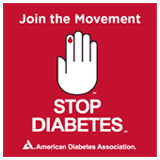Sound Bites Podcast: Learn, Connect, Engage: Peer Support Communities
Back for a third appearance on Sound Bites, the very successful Podcast of my colleague Melissa Joy Dobbins, MS, RDN, CDE, I discussed the value of peer support and peer support communities for people with diabetes and their caregivers. I was joined by two people from the diabetes peer support community, Anna Norton, CEO of Diabetes Sisters and a person with type 1 diabetes and Shelby Kinnaird, a peer support leader for Diabetes Sisters and person with type 2 diabetes.
Unveiling NEW Peer Support Resources for You
This blog was written with David Edelman and crossposted AADE
We’re super excited to unveil the new peer support section of the AADE website!
Got Diabetes? Click Open the DOC (Diabetes Online Community)
If you take care of your diabetes or you’re the caregiver for a friend or loved one with diabetes you know it’s a demanding 24/7/365 job. From day to day, even hour to hour, there are endless decisions to make to manage the tightrope of glucose control and stay safe. Over the course of a year most people with diabetes (and caregivers) interact just on occasion with their healthcare providers. You manage, or self-manage, your diabetes primarily on your own.
The good news is that over the last decade technology has increasingly allowed people with diabetes (PWD) and their caregivers to connect online. You’re giving and getting support, offering practical advice, sharing the latest research and technology news and much more.
Top 10 Take Aways from ADA 2013 – Part Two
 I recently attended the 73rd American Diabetes Association (ADA) Scientific Sessions in Chicago, June 21-25 where brilliant and dedicated researchers and health care professionals from around the globe gather to learn, share and connect. As a diabetes educator involved in the diabetes field nearly 35 years and counting, I was once again wowed by this meeting...and learned a ton!
I recently attended the 73rd American Diabetes Association (ADA) Scientific Sessions in Chicago, June 21-25 where brilliant and dedicated researchers and health care professionals from around the globe gather to learn, share and connect. As a diabetes educator involved in the diabetes field nearly 35 years and counting, I was once again wowed by this meeting...and learned a ton!
Though tough to choose, here are my top 10 take aways from the 2013 ADA meeting - divded into Part One and Part Two:
6. Delivering Improved Diabetes Care and SUPPORT Using Technology: It’s been said before and was said again and again this year, people with diabetes (and prediabetes) need ongoing and consistent support. As Marti Funnell, MS, RN, CDE said, “If we don’t address the emotional side of diabetes we won’t ever improve outcomes. It is an imperative!” And as Ed Fisher, PhD, of Peers for Progress (link) said, “Humans have fundamental need for support and social connections.” People not only need emotional support to manage this disease, but research clearly shows that to make the necessary health behavior changes and implement the management strategies for good control, people also need support. See #10 – The DOC.
The good news is today we have technologies, from Skype, to online systems, to tracking devices, telehealth tools, and more to come in the future, to incorporate important support systems. And numerous studies presented at ADA again showed that people do better with support…and that we can deliver this conveniently to people and more cost effectively.
Top 10 Take Aways from ADA 2013 – Part One
 I recently attended the 73rd American Diabetes Association (ADA) Scientific Sessions in Chicago, June 21-25 where brilliant and dedicated researchers and health care professionals from around the globe gathered to learn, share and connect. As a diabetes educator who’s been involved in the diabetes field nearly 35 years and counting, I was once again wowed by this meeting...and learned a ton!
I recently attended the 73rd American Diabetes Association (ADA) Scientific Sessions in Chicago, June 21-25 where brilliant and dedicated researchers and health care professionals from around the globe gathered to learn, share and connect. As a diabetes educator who’s been involved in the diabetes field nearly 35 years and counting, I was once again wowed by this meeting...and learned a ton!
Though tough to choose, here are my top 10 take aways from the 2013 ADA meeting - divded into Part One and Part Two:
1. DCCT/EDIC Results Heralded: A highlight of ADA was celebrating the 30 year anniversary of the landmark type 1 study, the Diabetes Control and Complications Trial. This trial was designed to answer the questions: Does good control matter? The DCCT began in 1983 and the conclusions were unveiled at the 1993 ADA meeting (I still remember the thrill of hearing the results live!). These results showed a reduction in the early stages of diabetes complications (eye, kidneys, etc.), by up to 76% compared with so-called “conventional therapy” – two shots of insulin a day.
Top Eleven Diabetes Websites
Today you've got immediate access to the latest research studies on diabetes. Beyond the research you’ll find guidance and guidelines for how to take care of your diabetes and stay healthy. But with this plethora of information at your fingertips how do you know which websites to trust and those to cast aside. These top eleven diabetes-focused websites link you to diabetes associations and organizations, government-sponsored sources and a few other well known, trusted and dependable resources.
Top Seven Diabetes Blogs/Social Networking Sites
Today people with diabetes have many more ways than ever of staying linked up on diabetes blogs and social networking sites. Check out my picks for the seven best sites. They're way more than blogs – they’re portals to online diabetes communities. You’ll find the latest research findings, stay abreast of the newest diabetes devices and technology advances or approvals of new medications.
ADA Launches New Stop Diabetes Campaign - Share, Act, Learn, Give
 November is American Diabetes Month and the kick-off for a new campaign Stop Diabetes - Make Diabetes Powerless by sharing, acting, learning and giving. Check out stopdiabetes.com.
November is American Diabetes Month and the kick-off for a new campaign Stop Diabetes - Make Diabetes Powerless by sharing, acting, learning and giving. Check out stopdiabetes.com.
Online Diabetes Communities Multiply
Social networking is the rage. People are sharing personally and professionally. For people with diabetes there’s been a ground swell of social networking sites. They offer opportunities to keep up with the latest diabetes research, products and technology, connect with others in your shoes and share your challenges and triumphs. And you get to do this with people globally. As a diabetes educator who’s been around for many years I realize that having diabetes can be isolating and that support is critical to successful management – medically and emotionally.




